
Some live in that idealized NH promoted by state officials and business leaders—living in quaint towns while working for a tech firm or health care organization and getting to play in the great outdoors. They live the NH advantage. And then there are those who cannot afford that dream life in the Granite State—where NH is not an outdoor amusement park but where they struggle for survival and dignity.
“It’s like a war zone out there,” says Josh Potter, referring to friends he has seen die over the past 10 years due to drug addiction. Potter was one of 24 people staying at a 40-bed shelter run by Concord Coalition to End Homelessness (CCEH) at the Congregational Church on North Main Street on the night of a snowstorm in early March. He and his wife had come to the shelter because they had lost an apartment. “And when it comes to looking for work, we’re treated like third-class citizens. If you walk in there with a backpack, forget it.”
Lack of access to clean clothes, showers, transportation to get to interviews or just “not [having] the data on a phone in order to respond quickly to employers” can present barriers for people experiencing homelessness who are searching for jobs, says Stephanie Savard, who stepped down April 3 after serving 26 years as chief external relations officer at Families in Transition (FIT) and from her role as director of the NH Coalition to End Homelessness (NHCEH). “People say there are a lot of jobs out there, but if you add all these challenges on top of ‘where am I going to stay tonight,’ that’s a difficult uphill climb in order to get through to the other side.”

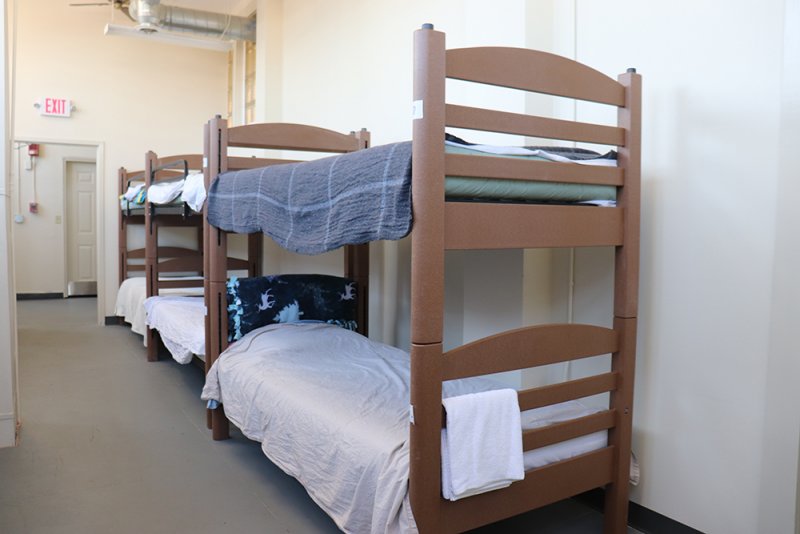
The Families in Transition Adult Emergency Shelter in Manchester provides people experiencing homelessness access to showers, a bed, nutritious meals and day programming. (Courtesy of Families in Transition)
On a single night in 2022, there were 1,605 people experiencing homelessness in NH, a 7.9% increase from 2021, according to the 2022 Point in Time (PIT) count gathered by the U.S. Department of Housing and Urban Development (HUD), which counts sheltered and unsheltered people experiencing homelessness on a single night in January. A total of 4,682 individuals (including families) experienced homelessness in NH in 2021, according to a report by NH Coalition to End Homelessness.
From state fiscal year July 1, 2020, through June 30, 2021, the total population of homeless individuals and people in families remained stagnant from the previous fiscal year. Family homelessness showed a 17% decrease due to eviction moratoriums and federal COVID-19 relief funding, the report states, while unsheltered and chronic homelessness significantly increased from 411 people to 1,082 people from July 1, 2019, to June 30, 2020. The report states this increase represents the extreme impact that COVID-19 had on the homeless population and attributes the doubling of unsheltered people experiencing homelessness to pandemic safety measures taken at shelters and low vacancy rates. The Council on Housing Stability’s 2021-2024 strategic plan sets a goal to reduce unsheltered homelessness by 30%. The number of unsheltered homeless individuals in 2020 was 264, including 77 families with children.
But Savard says the federal counts are likely a gross undercount, explaining that HUD and the U.S. Dept. of Education (DOE) both produce different counts.
“These counts only represent people who touch the system. People want a number to hold onto, but the reality is that with this population it’s very difficult to capture that,” she says, explaining that HUD’s definition of homelessness doesn’t include those people doubled up (living in shelters and transitional housing, hotels and motels or unsheltered) compared with the DOE which counts all including those doubled up. “Both counts can be helpful but we have two large federal systems that don’t agree on definitions.”
One thing that is known is that state-funded shelters in NH are full, and people are staying longer because there’s nowhere to go due in part to the state’s nearly 0% vacancy rate for affordable housing. “We don’t have enough emergency shelters for families, so they’re couch surfing a lot,” Savard says.
New Hampshire advocates for the homeless like Savard refer to this and other problems involving homelessness as a crisis needing more attention, and they say finding solutions is an ongoing struggle for care providers, as well as businesses and municipalities in all corners of the state due to the complexity of the issue. Stigma, mental illness, substance use disorders, intergenerational poverty, a sometimes less than sufficient political will, an uneducated public and a lack of affordable housing are just some of the many issues that complicate progress, advocates say.
One of the immediate challenges, says Adrienne Beloin, director of homelessness initiatives in Manchester, includes funding for state shelters. In January, eight mayors, from Berlin to Manchester and Nashua, as well as Claremont to the Seacoast, sent a letter to the state appealing to the governor and other state officials to address this issue. “We know that the state-funded shelters are full, and people are staying for a longer period of time because there’s not a next place for them to go,” Beloin says, adding that mayors and other leaders from nonprofits working on the issue are encouraging the state to focus on transitional, supportive housing. “That’s a critical need right now. And we’re hoping the feedback we have provided [to the state] will be acted upon.”

Adrienne Beloin, director of homelessness initiatives for the City of Manchester. (Courtesy photo)
The Complex Layers of Homelessness and Trauma
Will Arvelo, executive director of Cross Roads House in Portsmouth, says simplistic explanations for why people experience homelessness don’t work and that an ongoing need to educate the public about what homeless is, how it happens and how it affects people is crucial. “There’s a notion people have in their minds about homelessness, that it’s either somebody who has a substance use disorder or who is irresponsible and not taking care of their life, but that’s too easy of an explanation for something that’s very complex.”

Will Arvelo, executive director of Cross Roads House in Portsmouth. (Courtesy photo)
Arvelo, who became director at Cross Roads last summer after serving as president of Great Bay Community College for 11 years and then as the state’s director of economic development, experienced homelessness for two months in the 1980s while attending college in Phoenix, AZ. He explains that homelessness can happen very quickly to people who have never been homeless and that the trauma of being unhoused can be devastating. “The world collapses in on you. You find yourself sleeping in a parking lot or a shed. I can tell you that when you lose a roof over your head, and you have no sense as to where you’re going to sleep or where you’re going to get your next meal, your brain changes,” he says. “You become completely preoccupied with survival and trying to figure out how to get help.”

Clockwise from left: Susan and her family, residents of Cross Roads House. Former residents James and Zachary. (Courtesy photo)
Angela Langevin, one of the shelter volunteers for CCEH in Concord who also works as a case manager for Community Bridges, says being homeless, on top of other problems, poses the threat of substance abuse as well as sexual and domestic abuse. “A lot of sexual abuse goes on out there, and not all of it is reported,” she says, explaining that people who are abused don’t always know how to report these crimes. “And also, their abusers are sometimes the ones getting them high.”
One reason the Concord shelter wasn’t full on the night of the snowstorm in early March, Langevin says, is because the beginning of the month is when people’s Social Security and other money comes in and that some people opt to pay for motels or to stay outside at these times. “The people here tonight are consistently the ones who use the shelter,” she says.
Savard says trauma and homelessness often go hand in hand whether the trauma existed before the experience of homelessness or was caused by it. “It’s a what came first, the chicken or the egg question,” she says, adding that some people who have experienced trauma cope with it by turning to substances. “You can certainly have a history of trauma and need to manage that. And homelessness itself is also extremely traumatic.” Programs, she continued, work hard to be trauma informed but don’t always have the tools or the funding to be creative.
“The funding shelters receive from the state is so small, and they can only do what they can do with the resources in front of them for trauma work,” Savard says, explaining that congregant settings can be triggering for people with traumatic histories and that shelter providers, whose hearts are in the right place, are operating on a shoestring budget.
Homeless people need a variety of services including health care, mental health services, as well as welfare and employment assistance, Arvelo says, adding that the people Cross Roads provides shelter for are representative of the general population.
From a funding perspective, Arvelo says it’s more efficient and humane to make sure people have proper case management and to be aware that everyone’s needs are different. “We have caseworkers assigned to every homeless person or family, and it takes time to figure out what their needs are to help them get rehoused. We don’t just offer three meals and a bed.
We have people with multiple issues,” he says. “Often [homeless] people have no credit history, there are documentation issues, a poor rental history....There are multiple layers to all of this, which again, most people don’t understand or realize.”
One of those layers, Langevin says, is that even when people have housing vouchers, they can face years-long waits and rejections from landlords. “Even people with money or a voucher can’t always find a place,” she says, explaining that one man she spoke to recently was told by a landlord that he needed to have an income of $50,000. “If he was making that money, he wouldn’t be eligible for a voucher. There’s a lot of stigma.”
Gordon Hollingworth, 28, who was staying at the CCEH shelter in early March, has secured subsidized housing in the past. He says he wants a sense of autonomy and to have friends in his life but is “afraid of finding a new home” following an eviction from an apartment on the Seacoast in which he felt scrutinized by neighbors and his landlord. “I wish we had income-based housing or something for low-income people that was segregated by age groups.”
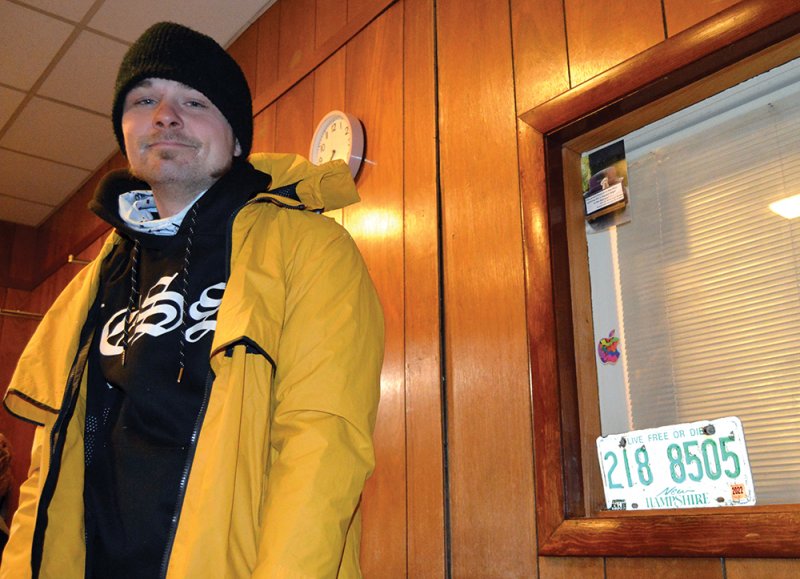
Gordon Hollingworth at the Concord Coalition to End Homelessness shelter. (Scott Merrill)
Savard says that age or gender segregated housing could be beneficial, and that some funding has been appropriated for the 18 to 24 age range, but that creating these arrangements with HUD money can be difficult due to fair housing laws. “There’s not enough funding to go around as we all know. That’s why we’re advocating for emergency shelter funding through state legislation…let alone supportive housing. It’s complex,” she says.
The Challenges of Finding Work
“Just get a job.” It’s the knee-jerk reaction many have when they see someone begging on the streets. After all, this is NH where many employers can’t find enough people to fill their job vacancies.
Hollingworth, who has been camping and staying in shelters in and around Concord, says the stigma of being homeless can be devastating when securing a job. “When you go in for a job, they see that backpack and after you leave, they throw your application away,” he says. It all leads to frustration with a system that has let him down or challenged him time and again. “I’m a walking protest right now,” he says.
The reality is when a person is in survival mode and managing a feeling of deep vulnerability, it is a barrier to finding work, and this doesn’t stop when a person secures a home, Savard says. “Challenges don’t go away when you turn the key. Sometimes they can rear up more.”
Director of Programs at CCEH, Angela Spinney, says for many homeless people, the basics Savard mentions—things many people take for granted— such as hygiene and access to the internet, become obstacles for job seekers. “A lot of times they don’t have access to vital documents, such as a driver’s license or a Social Security card and finding jobs often requires a connection to internet,” she says, pointing out that the library is the only option in many cases. For a callback address, she says people use CCEH. “Honestly it’s the day-to-day things like this that make it difficult.”
A criminal record can also be a barrier. Spinney says CCEH tries to find felony friendly local businesses and that a gas station in Concord has been an employer of one individual with a felony for the past year. Other placements with local businesses have lasted for years, she says, but typically CCEH refers people to People Ready, a temp agency in Concord.
“We also help people get their resume together, offer job coaching, and a current employment board that has job opportunities listed on it,” she says. “For most of our folks, stabilizing mental health and recovery issues are the main issues, as well as getting showered each day and finding transportation to a work site.”
Savard says keeping a job is difficult for unsheltered people because of adverse life experiences. “Temps are the ones willing to say yes more than any other employer,” she says. “[People] can do a day or two and often bounce around.”
Mayors Meet with DHHS and Gov. Sununu Staff
It’s a daunting challenge to take care of the state’s homeless population, and there are many questions about how state and federal funding is spent with the array of nonprofit organizations that provide services to people experiencing homelessness (often referred to, for state and federal funding purposes, as the Continuum of Care or CoC). CoCs are collections of agencies, nonprofits and other organizations working together in a particular area to make sure disadvantaged people can access programs and services. They are also the funneling mechanism for HUD’s consolidated homelessness grant.
This is what led eight mayors from across the state, including Manchester Mayor Joyce Craig and Berlin Mayor Paul Grenier, to appeal to Gov. Chris Sununu and Dept. of Health and Human Services (DHHS) Commissioner Lori Weaver in January for help assisting unhoused people following a weekend in which two homeless people died and one woman gave birth in a tent.
The mayors’ letter to Gov. Sununu emphasized a Housing First model (an assistance approach prioritizing permanent housing) with a plea for assistance with more shelter beds and other services. The governor’s response cited several funding initiatives and work being done on the state level that addresses issues of homelessness and reminded the mayors they are “accountable for addressing the unique needs in their communities.” However, the governor offered to meet with them.
The meeting between DHHS, staff from the Governor’s Office and several mayors took place Jan. 20. The goal, says Beloin, the director of homelessness initiatives in Manchester, was to ensure that the governor and DHHS understood the challenges being faced at the local level. “We had a very candid conversation and that has been appreciated,” Beloin says. “We voiced a number of our concerns and continue to work toward solutions to address the statewide challenges.”
Beloin and Grenier say all the mayors agreed the meeting with DHHS and the Governor’s staff was a beneficial first step because challenges such as increasing emergency shelter beds statewide, medical respite, and services for homeless youth—issues appealed for in their letter— were at least made clear. Beloin also says DHHS has requested funding for shelter beds not included in the Governor’s budget. “I hope the legislature pays attention and acts on the needs of our local communities,” she says.
A representative from Gov. Sununu’s office responded to questions about the meeting and the ways the state is addressing homelessness, saying, “Currently, the state is considering how best to implement feedback from that meeting and open lines of future collaboration on the issue.”
The state has invested $100 million into the InvestNH fund, which financially rewards municipalities for approving and building housing at an accelerated rate and provides gap funding to developers for projects. That is in addition to the more than $300 million that the NH Emergency Rental Assistance Program and CARES investments have already provided in direct rental assistance to more than 25,000 Granite State households and the more than $55 million that the governor’s budget calls for allocating to housing issues.
The Burden on Cities
Grenier says the mayors who signed the letter have not been able to see how state funds have been spent and that this was a big reason for appealing to the state. “Who’s getting what? It’s difficult to get any kind of information,” he says. “I don’t want to put the entire blame on the state. It’s a serious problem, but the state needs to be a partner at the table and they’re just now realizing they have to do this.”
Grenier says Berlin’s welfare budget is being used up and that homelessness places an “unfair” financial burden on all cities in NH. “We’ve always been conservative with our welfare budget and always turned funds back at end of the fiscal year, but it’s being used up because of rising heating costs,” he says.
He adds that one of the good things about Berlin not having a hotel is that it prevents people who are homeless from being housed there, which he says would burden the city’s already shrinking welfare budget. “By signing the letter, what I wanted to do was help the mayors of the two largest cities chronically dealing with the problem shine a light on this issue. It’s not a Berlin issue or a Manchester issue, it’s a statewide issue, and Gov. Sununu and this administration has only given lip service to the severity of the problem.”
Grenier says he is pleased the state met with the mayors to listen to their concerns but adds, “Look how much noise we had to create just to do that.”
“It’s a lot of money going to NGOs to provide services and there’s a disconnect between them and the municipalities. In Berlin, we have a tight relationship with the Tri-County Community Action Program. We don’t have the problem that Joyce Craig in Manchester and Jim Donchess in Nashua have with these programs getting millions of dollars,” he says, adding local officials are not informed about how much state money community action programs are receiving and how that money is being spent. “None of us have been able to get an answer on how the state funds have been spent, who’s getting what. It has been difficult to get any kind of information. We haven’t asked for it from Tri County Cap because they’ve been very responsive to our needs, and there’s been no issues.”
Beloin says that while there is robust data collection, cities are often blind. “I’m sometimes asked by aldermen what the CoCs are doing, and we don’t always know. Someone in my role doesn’t have the benefit of looking at a dashboard to see where all of the money is being spent,” she says, adding that she hopes changes can be made to break down some of these walls.
Manchester’s 2023 budget for the Dept. of Homeless Initiatives has set aside $3.6 million that will go toward housing and homelessness, as well as community programming and social services for vulnerable people, Beloin says. “The state has a good handle on the data in terms of the money, but the issue is the city. I don’t have access to that data,” she says.
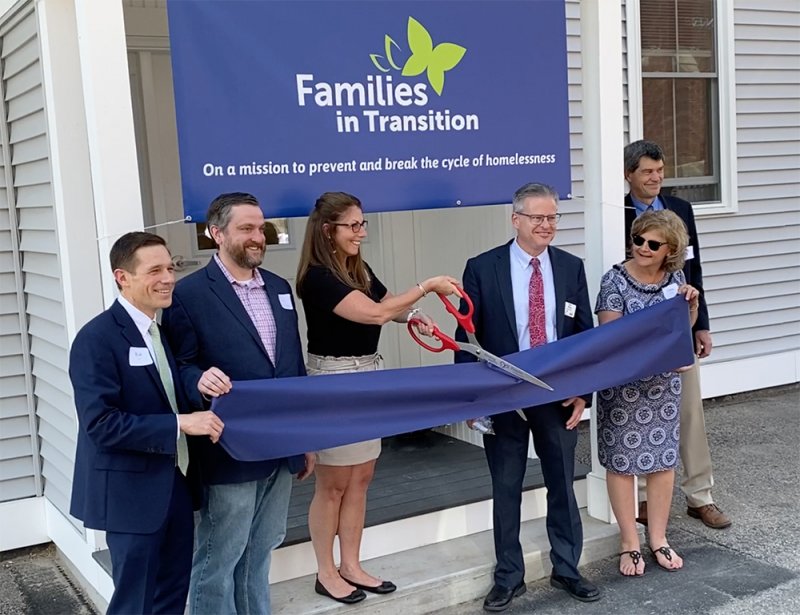
Families in Transition board members at the grand opening of a permanent supportive housing facility on Union Street, developed in partnership with NH Housing Finance Authority and the city of Manchester. (Courtesy of Families in Transition)
It is clear the state is investing millions in affordable housing and homelessness initiatives, including: $100 million for InvestNH to make rapid investments in more affordable housing, $20 million for families in crisis through this winter, $4 million to build statewide health care access for individuals experiencing homelessness, $4 million for emergency shelter bed capacity and expansion in addition to the state’s $2.9 million annual general fund appropriation, $2.25 million for the landlord incentive program and $1 million for winter warming shelters.
Savard says the Governor’s Council on Housing stability, created in 2020, has worked hard to be transparent about the funding nonprofits receive, but there still remains confusion about what that funding can pay for. Not all funding funnels through the state, she says. “Some goes directly to the CoCs, and a lot of times people think the funding can pay for emergency shelters, but it can’t,” she says, explaining that HUD money coming through CoCs is specific to supporting permanent housing, transitional housing and rapid rehousing. “It’s not meant for emergency shelters. That money can’t be converted to that. We’ve tried to do education on this because people don’t realize what the funding is for. It’s a great resource, because it pays for permanent supportive housing, which is needed and for some of the individuals showing up in need of long-term supportive services.”
Grenier says a common thread among homeless populations across the state is substance misuse. “Virtually everyone we deal with at city hall has some type of substance abuse issue,” he says, noting more than half of Berlin’s homeless population (about 20 to 35 people at any given time, he says) are not from Berlin and that other cities are experiencing a similar influx. “They come from other parts of the state. Berlin doesn’t have the same number of services Manchester does, but it has more than in Colebrook or Groveton. I can tell you one thing. If someone ever tried to build a homeless camp in the center of Berlin, we’d chase them out...we’d take the black eye. Berlin has had enough struggles that that’s the last thing I’d want visitors from outside the area to see: a homeless camp on Main Street.”
Grenier is referencing a large homeless encampment that developed along the sidewalks in the center of Manchester outside a homeless shelter this winter. It became the center of public debate, and in January the city had the encampment cleared after a superior court judge ruled in favor of the city’s plan to clear it after setting up an emergency winter shelter at a senior center.
Strategies to Address Homelessness in Manchester
In Manchester, Beloin says her office is working on a variety of short term, immediate and long-term planning needs and that problem solving involves finding ways to get people permanently housed. “We are looking into strategies to expand housing opportunities in Manchester. We need things that are affordable, deeply subsidized, and that come with supports in place to live in independently.”
She cites a variety of housing that could be part of the solution, including dormitory housing and congregate housing, as well as housing for young people that can provide support and help them thrive. “We need a variety of those offerings, but solutions on how best to fund them and get them set up remains to be seen; that’s part of our strategy we’re developing.” When it comes to increasing emergency shelter space, Beloin says the city is looking at a variety of options. “We don’t have enough of them, and some people are choosing to stay outside, rather than access emergency shelters,” she says, explaining the reason for this is often due to rules and regulations—such as limits on personal belongings—at the shelters. “We would like to have lower threshold options that are more flexible for folks to get inside, and the purpose isn’t for fatality prevention or warming but to introduce them to service providers who can have a functional way to contact them. Almost every homeless individual staying with us in our emergency winter shelter has no reliable way to contact them.”
Beloin says there is a need for many more apartments and to redefine what housing means. “We have a variety of needs on the streets. Some need a job and a haircut and supports to get back on their feet. Some people need 24-hour care,” she says, adding that black and white thinking that focuses simply on shelters and apartments doesn’t work and often perpetuates stigma. “As a society we need to appreciate this and have data to document it [in order to] build the appropriate resources for them.”
Solving Problems Upstream
Savard, a licensed social worker who is well known among those who help the homeless population, completed her last day as chief relations officer for Families in Transition on April 3. She says she stumbled into the homelessness advocacy work that has defined her career for the past 26 years in graduate school after an internship fell through. “There’s something so complex about this work,” she says. “I realized quickly there are needs people have that often go beyond housing. You can provide the home, but there’s so much more underneath…there’s domestic violence, trauma, substance use, physical and mental health, lack of education.”
Savard is now working for a community health center in Manchester where she is applying her experience and knowledge to issues such as teen pregnancy prevention and intervention with kids who have had traumatic events in their lives. She says her new role allows her to focus on preventing people from getting into the cycles that she has witnessed throughout her career.
“What I love about programs offered by Families in Transition is that they provide more than just housing,” she says, explaining that her decision to move on stems from a wish to confront the complex issues of homelessness upstream. “We have to stop the flow. My new role is more about finding ways to stop the stream to the shelters, to stop the stream of need for homeless services in the first place. It’s a difficult decision because I love this field so much, but I needed to change my approach.”
Helping Low-Income People Facing Eviction
Low vacancy rates for affordable apartments in recent years have affected those who live below the poverty level more than renters in general, says Lauren Greenwald, director of NH Legal Aid’s (NHLA) Housing Justice Project. “Many of our clients are below the poverty level, and they are impacted the most severely because they couldn’t fund a long hotel stay if they needed to. They’re often looking at shelter space or homelessness,” she says.
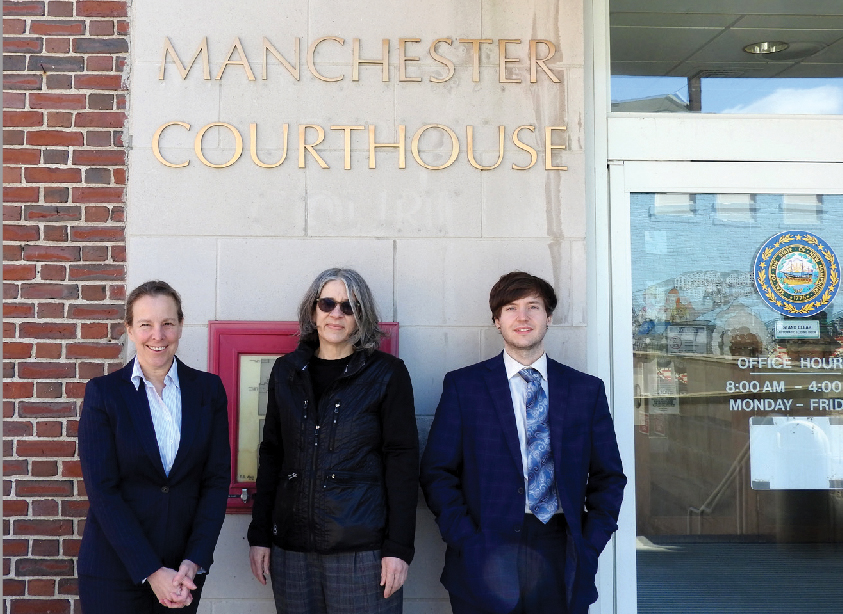
NH Legal Aid staff from left: Lauren Greenwald, Housing Justice Project director; Karen Dorr, administrative manager; and Stephen Tower, managing attorney. (Courtesy of NHLA)
For clients facing evictions that seem difficult to defend, Greenwald says NHLA will sometimes negotiate with the landlord for a non-eviction outcome but that this isn’t always possible. “Depending on the issues, sometimes the owner is selling the property and needs everyone to clear out due to a renovation, or there’s a lot of water under the bridge with the tenant and there’s just no rescuing the situation. In those cases, we try very hard to negotiate additional time for the tenant,” she says.
Greenwald says she and other attorneys remind their clients looking for Section 8 public housing assistance to apply for a voucher with their housing authorities even knowing the process of securing a voucher could take years.
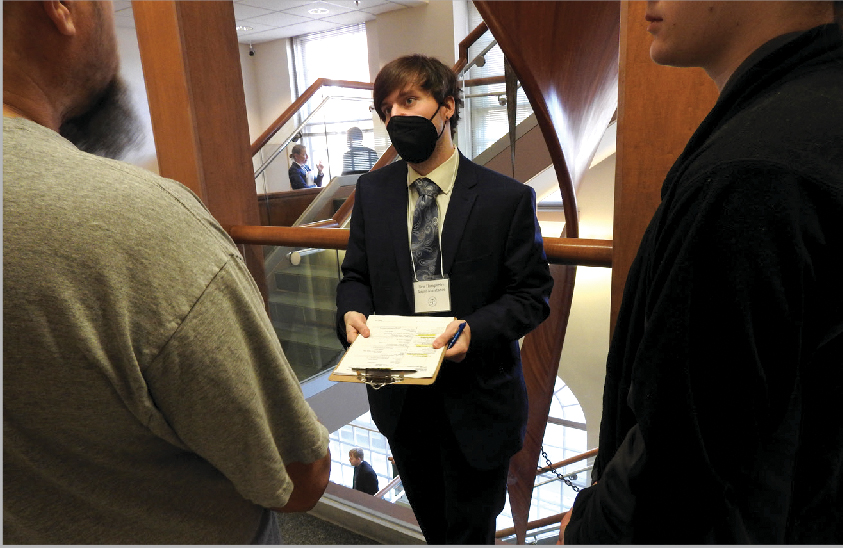
Stephen Tower works with clients facing eviction. (Courtesy of NHLA)
“That’s a constant refrain in our advice to clients who are low income,” she says, explaining that while people understand it will take years to obtain a housing choice voucher, it is important to join that waiting list as soon as possible as a long-term strategy to achieve eventual housing security.
Editor’s Note: This series on homelessness continues in the May issue with a story focused on homelessness among NH’s youth population.

 Current Issue - May 2024
Current Issue - May 2024